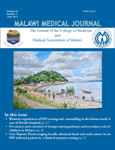
|
Malawi Medical Journal
College of Medicine, University of Malawi and Medical Association of Malawi
ISSN: 1995-7262
Vol. 25, No. 2, 2013, pp. 36-39
|
 Bioline Code: mm13010
Bioline Code: mm13010
Full paper language: English
Document type: Research Article
Document available free of charge
|
|
|
Malawi Medical Journal, Vol. 25, No. 2, 2013, pp. 36-39
| en |
Womens experiences of HIV testing and counselling in the labour ward: A case of Bwaila hospital
Hamela, G.; Tembo, T.; Rosenberg, N.E.; Hoffman, I.; Lee, C. & Hosseinipour, M.
Abstract
Introduction
HIV counseling and testing during labour can be emotional, but is
important because it allows mothers and babies to receive PMTCT
prophylaxis if previous identification of HIV infection has not occurred.
The study explores how HIV testing and counseling during early labour
affects women.
Methodology
This was a qualitative exploratory study to understand women’s experiences
during early labor. From September to October 2009, we conducted 10 in-depth
interviews with women who tested for HIV during early labour. We
recruited women who tested > 3 months previously and those who had
never tested for HIV from the postpartum ward of Bwaila Hospital. Data
were analyzed manually using the life story approach in order to examine
and analyse subjective experiences of women and their constructions
of the social world. Transcripts were read multiple times to understand
meanings which participants attached to their experiences. We coded data
according to emerging themes and subthemes.
Results
Ten women 20-35 years were interviewed. Eight women had unknown
HIV status while two had known HIV results but re-tested to update
their status. Four women were found HIV-positive while 6 were HIVnegative.
The primary theme was that women appreciated and accepted
HIV testing and counseling. Testing was accepted as a necessary step to
protect the infant from HIV infection. Counseling was viewed as helpful
for acceptance of HIV status. One key subtheme was that HIV positive
women experienced disappointment about their HIV diagnosis, though
this was outweighed by the knowledge that one could protect her infant.
All women viewed the short time to complete the counseling and testing
procedures as favourable.
Conclusion
Labour testing is acceptable and should be promoted to enhance PMTCT
services by identifying HIV positive women with unknown status.
Counseling helps women to accept being found with HIV and seek
appropriate services.
|
| |
© Copyright 2013 - Malawi Medical Journal
Alternative site location: http://revista.uft.edu.br/index.php/jbb/index
|
|
